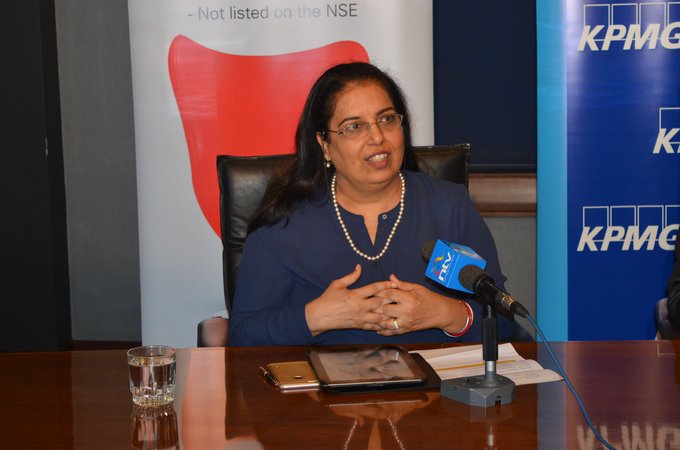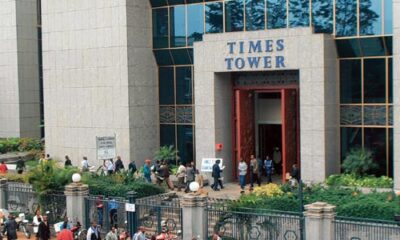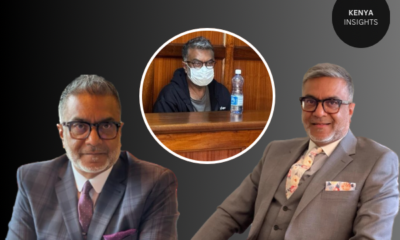Tineyi Kuipa, the senior investment officer at Enko Capital Management based on South Africa is counting loses years after what they believe was a well choreographed fraud scheme by Software Technologies Ltd (STL) whose founder is the late Jyoti Mukherjee and was packaged as the fastest growing software solutions provider and information technology (IT) training company in Kenya.
The firm has served both state entities and large corporates including Safaricom, Equity Bank and KenGen and churches such as Christ is the Answer Ministries, Capital Markets Authority (CMA) and the Ethics and Anti-Corruption Commission(EACC).
It is however reported that there were many ‘fictitious’ customers that STL added to its list, eventually striking them out, and managed to inflate its size and value.
Enko Capital fell for the bait and wanted to acquire stake in the company that was a huge elephant in paper but size of mouse on the ground. The South African firm conducted their due diligence on STL but they were way ahead, covered all the tracks, Enko eventually was convinced that they had a good deal and bought stakes in STL.
“We saw the numbers and believed them. We thought we were buying an elephant. It turned out to be a mouse,” Mr Kuipa said in a recent interview with a Kenyan newspaper.
STL which is facing fraud investigations regarding their books awed many corporates with its paperless board meeting software.
Mr Kuipa told the newspaper how Enko Capital fell into the trap of buying a 20.14 per cent stake in STL, which despite having been audited by a ‘Big Four’ audit firm, did present its true state of accounts to investors, now being unravelled by Directorate of Criminal Investigations (DCI) investigations.
STL’s audited accounts had shown Sh887.45 million in revenues and Sh194.84 million net profit for the financial year ended June 2018.
This performance would later turn out to be castles in the air as revenue reduced to Sh220.77 million and net profit shrunk to Sh48.82 million after the accounts were restated at the height of the scrutiny. “The irony of it all is that this company has been selling governance software to big companies,” says Mr Kuipa.
Enko Capital, a private equity investor targeting mid-cap growth companies across Africa, had relied on the stated financial results to make their first and so far the only investment in Kenya.
From the reviewed documents, a picture of fictitious customer emails and non-existent intellectual property (IP) assets on the balance sheet come out, leading to revenues and net profit being overstated almost four times their actual value.
Before that, Enko engaged Grant Thornton Consulting Ltd on September 19, 2017, to carry out financial due diligence on STL. The private equity fund also approached Kaplan and Stratton Advocates the same September 2017 to conduct legal due diligence on STL.
Grant Thornton, in December 2017, handed Enko an 89-page document christened ‘Project Cyber.’ The two due diligence reports listed the main shareholders as Jyoti Mukherjee (19 per cent), Sanjivan Mukherjee (19 per cent), Chaitanya Mukherjee (16 per cent), TBL Mirror Fund (22 per cent) and Mawa Holdings Ltd (10 per cent).
Jyoti Mukherjee, now deceased, started the firm in 1991 and guided the company to make a mark in infusing technology into the boardrooms of many firms in Kenya.
Ms Mukherjee tagged her husband Sanjivan Mukherjee, their son, Chaitanya Mukherjee and daughter Nivedita Mukherjee, to co-run the company whose clients, it said, covered over 11 countries in Africa.
STL’s main product was the eHorizon eBoard, which allows paperless board meetings.Ms Mukherjee bagged several accolades for her achievements with STL including Ernst & Young’s Entrepreneur of the Year, a Timeless Woman of Wonder, and the Top Businesswoman in ICT many times over.
Grant Thornton’s due diligence indicated that STL was a growing company, with revenues having moved from Sh524.9 million in 2014 to Sh655.04 million in 2016 and Sh773.8 million in 2017. The report showed STL had acquired 21 new customers in 2017 alone and had brought in additional revenue of Sh42.24 million.
STL’s assets had moved from Sh515 million in 2014 to Sh838 million in 2017. But there were some red flags too. The audit firm for instance noted that STL did not “properly maintain its IP (intellectual property) register” and that it did not also maintain data to verify how much revenue it had earned from the newly developed software.
Meanwhile, Kaplan and , also handed Enko a 376-page legal due diligence report christened ‘Project Tara’ which shed light on the operations of the company and the ownership structure. The financial and legal due diligence, backed by audited results and management accounts from the STL board convinced Enko to buy a 20 per cent stake in STL at 5 million dollars (Sh594 million).
Out of the $5 million, $4 million (Sh472 million) was to purchase shares while $1 million (Sh118 million) was a shareholder loan to boost the company’s operations. With too much glitter, there was not much gold in STL? Enko believes so and has invited DCI to weigh in.
Share purchase and subscription agreement show the purchase deal was signed on September 17, 2018 and closed on October 26, 2018.
STL’s retained earnings were reflecting as Sh970.8 million. STL management gave Enko the books of accounts for the financial year ended June 2017 and management accounts for the year ended June 2018, stating that they were “a true and fair view” of the company.
“The management accounts are fair and not misleading and do not misstate the assets and liabilities of the group nor the profits,” STL stated in the share purchase agreement.
Enko agreed to the deal which made it the largest investor with a stake of 20.14 per cent.
Jyoti and her husband, Sanjivan, took a 16.21 per cent stake each while their children — Chaitanya (known in the board room as Chets) and Nivedita — held 13.9 per cent and 7.52 per cent. TBL stake became 16.04 per cent while the rest of the shareholders held below one per cent.
Audited accounts
After the deal, Jyoti emailed the STL board, then chaired by Bitange Ndemo, to inform them to diarise four board meetings for 2019 — February 28, May 16, September 5 and November 21.
The main item on the agenda for the February 2019 meeting was going to be the consideration of the draft audited accounts for 2017/2018 financial year and budgets for the same year. For Enko, it was now time to settle in and help STL grow and spread to countries such as Zambia, Tanzania, Uganda, Malawi and Nigeria and push up the sales.
Stephen Omwenga, the STL finance director, who would, later on, be sacked, was required to circulate the draft financial results ahead of the first board meeting of 2019 — also the first with Enko on board.
Ralph Gilchrist, the private equity fund manager at Enko Capital added that their main concern as Enko would be to “ensure appropriate treatment” of intangible assets in the 2018/2019 financial statements. Mr Gilchrist said Enko would also hope for adequate documentation of internal processes to support how the company was treating its intangible assets.
But Mr Omwenga, who was copied in the emails and even addressed directly, was taking longer than the “by close of business tomorrow” that he had committed to share draft financials and explanation on STL’s treatment of intangible assets. “I am becoming concerned that this is taking so long to finalise,” wrote Mr Gilchrist on March 19, 2019.
Enko was beginning to send signals that it was still flying in the dark many months after becoming the main shareholder in STL.
Meanwhile, Enko pushed for the change of auditors who had been scrutinising STL books for about five years.
The recruitment of Mazars Kenya as the new auditors would prove to be a vital turning point.
Mazars Kenya commenced the audit on the 2018/2019 financials. During the course of that audit, they were checking the level of revenues. They realised the accounts were not adding up. There were customers who could not be traced, suppliers with no known addresses and therefore profits and assets that did not actually exist.
“Mazars were checking the revenues and they said to us they can’t verify the existence of certain clients which had been given to us by management,” says Mr Kuipa. STL had told Enko it has resellers in places such Nigeria, Dubai and the Middle East. But when Mazars dug into these resellers, they could not verify their existence or the clients from such markets.
When Mazars asked for details of these clients, STL produced emails, invoices and email addresses supposedly from and belonging to these resellers, clients and suppliers. Mazars wrote to the email addresses given by STL management as part of audit confirmations and also performed a domain search for the same email addresses.
This was when Mazar realised that the email addresses for the clients in question had been created at the same time the audit started.
The finding was startling. Mazars auditors asked STL to facilitate a physical meeting with some of these resellers in places such as Nigeria and Dubai. STL developed cold feet.
The year 2019 dragged on. The creation of software was an expense that was supposed to create IP assets on the balance sheet. And if the suppliers of that software are non-existent, so is the IP asset that was on STL’s balance sheet.
“This was carried out with the intention of inflating the size of the company so that they could appear to be much larger than they were and justify a higher valuation on the shares we paid for as an incoming investor,” says Mr Kuipa.
Mazars auditors in late 2019 wrote to the board saying they were unable to verify the existence of significant revenues, customers’ and suppliers’ expenses and would therefore issue a disclaimer opinion on STL books of accounts.
The partner who led the Mazars audit comes from forensic fraud investigation background. Mr Kuipa believes this gave the Mazars’ audit lead the upper hand to uncover in the first year of audit what they had missed in over three years.
On January 24, 2020, Jyoti, the founder of the company passed on. Jyoti’s death only served to deepen the mystery that had become of STL. Enko had to join the board members in the mourning.
Jyoti’s family said she was diagnosed with acute myeloid leukemia on the evening of January 21 and succumbed just three days later at the Aga Khan Hospital.Only after the mourning would Enko resume the inquest into the affairs of a company they thought they knew much about but was now carrying many unknowns.
Jyoti’s son, Chets who had served as the operations director, became the acting CEO.
On February 28, 2020, Enka reminded Mr Omwenga in an email that “we really need to understand as a matter of urgency what the real EBITDA (earnings before interest, taxes, depreciation, and amortisation) for the company are.”
Mr Omwenga replied three days later that the delay was because the process involved getting all the invoices and going through several files to get all the information.
He did not respond to email reminders from Enko on March 6 and March 10, 2020, further fueling suspicion. When Mr Omwenga eventually shared the document, it was a bombshell.
The document showed that STL had been inflating revenues and expenses. “Please find the duly filed sheet as requested, the values here are the draft form to reflect the actual position but this can only be firmed up upon the intended audit,” Mr Omwenga wrote later in March 2020.
In a board meeting held on March 27, 2020, Chets told shareholders that revenue for the year to June 2020 was likely to be between $2.5 million (Sh295 million and $3 million (Sh355 million).
This was a shocker, especially to Enko who was not given any commercial explanation for the sudden shrinking of revenues by such a large margin.
Minutes of the board meeting held on April 27, 2020, the second after Jyoti’s death, painted a board that could no longer hide that something about STL was amiss.
The audit committee promised to get Mr Omwenga to write an explanation about what transpired. Mr Omwenga told the Mazars in a May 14, 2020 email that he had eliminated over 27 ‘project accounts’ in the sheet that he had shared so as to reflect the correct position of STL’s books.
Project accounts was a term coined by STL management to refer to fictitious accounting entries which were created by management and had no backup accounting source documents such as invoices and cash receipts.
These accounts, which represented dealings with different non-existent firms and individuals, had the effect of inflating STL’s revenues and expenses. The fictitious entries in turn led to higher revenue and allowed the management to justify a higher valuation for their business.
The case is ongoing in court as Enko chase to recover their Sh594 million investment.
Additional reporting by The Standard


 Business1 week ago
Business1 week ago
 News6 days ago
News6 days ago
 News1 week ago
News1 week ago
 News7 days ago
News7 days ago
 News1 week ago
News1 week ago
 Investigations2 weeks ago
Investigations2 weeks ago
 News2 weeks ago
News2 weeks ago
 News7 days ago
News7 days ago












